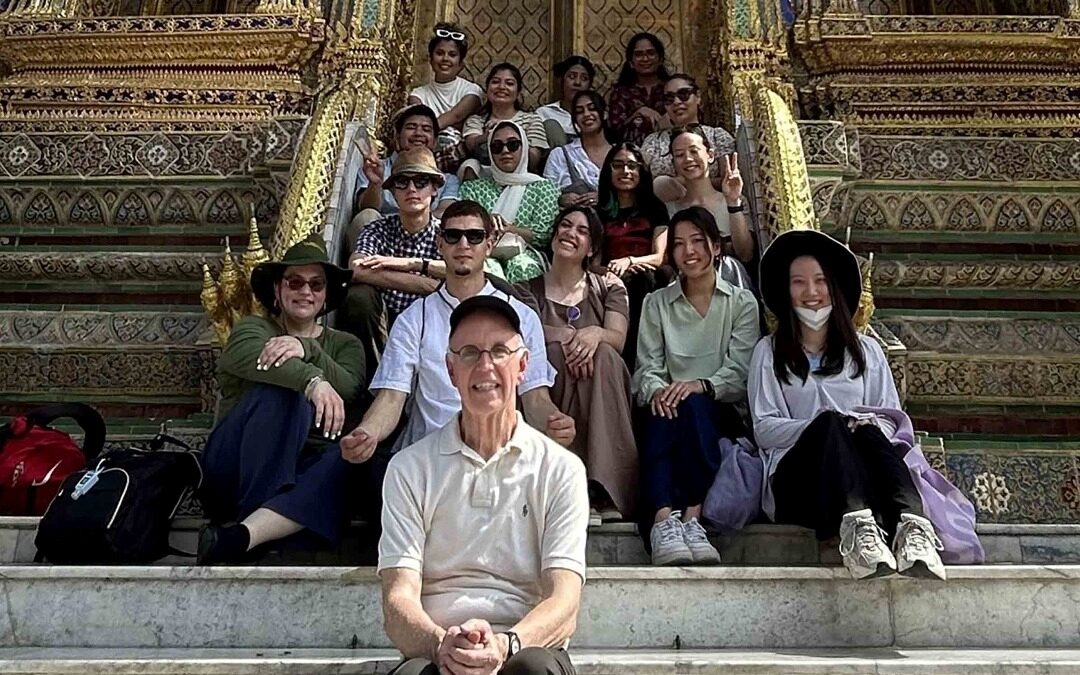As a public health scientist and professor at Rutgers University–New Brunswick, Mark Robson prefers taking his students out in the field, which happens to involve a two-week trip to Thailand.
After a three-year pandemic pause during which the program was conducted remotely, Robson has resumed his annual service-learning visit to the southeastern Asian nation known for its universal health care system.
“It’s a very homogeneous society,” said Robson, a Rutgers Board of Governors Distinguished Service Professor and Distinguished Professor of Plant Biology at the School of Environmental and Biological Sciences. “But it’s a place where, if you are the dad or the mom, and you say, ‘Dr. Robson, is this a place where my kids are going to be safe?’ I would say absolutely. I’ve taken my own kid there.”
The professor and 16 of his students flew to Thailand in late May and concluded their hands-on, public health-focused study abroad program in early June.
Robson, who also is a core faculty member of Rutgers Global Health Institute and has led these summer study trips to the Kingdom of Thailand for 12 years, said this first visit since COVID-19 hit went “really, really well.” (“Other years, we had everything from monkey bites to urinary tract infections,” he said.)
The program “exposes these young people to a system that is very unique for them,” said Robson. “It also, I hope, inspires them to think about a career in public health, especially with a global aspect.”
Students were divided up into groups to conduct service learning at three rural clinic sites outside of Bangkok. They conducted home visits with the nursing staff, spent time assisting a pharmacist, participated in noncommunicable disease training, and learned how to prepare traditional Thai food.
Students also did some cultural immersion, including a visit to the Grand Palace, a royal complex at the heart of Bangkok; lunch at Dusit Thani College, a private institution focused on the tourism and hospitality industry; and a workshop on Buddhism, which is practiced by more than 90 percent of the Thai population.
Robson, who grew up on a farm in Burlington County, New Jersey, studies pesticide toxicology and exposure reduction to agrochemicals. A Rutgers faculty member for more than 44 years, Robson is a university alumnus who holds a doctoral degree in plant science and a master of public health degree in occupational and environmental medicine. He is a member of a number of national and international health committees, including stints as the chair of the Public Health Standing Committee on the New Jersey Department of Environmental Protection’s Science Advisory Board and the New Jersey Drinking Water Quality Institute.
Maira Salim, an incoming senior pursuing a major in public health and a minor in biological sciences, said the trip to Thailand was an incredible experience.
“It provided me with a unique opportunity to immerse myself in a different culture, gain valuable insights, and broaden my perspectives,” said Salim, an Edison resident attending the Rutgers School of Arts and Sciences as well as the Edward J. Bloustein School of Planning and Public Policy. “I was struck by the remarkable nature of the country’s health care system and the dedication of its government in ensuring the well-being of its populace.”
Salim added: “The class itself was engaging and thought-provoking, allowing me to explore various aspects of Thai society, history, and traditions. I had the chance to interact with local communities, visit historical sites, and learn from distinguished public health workers. Overall, it was a truly enriching educational journey.”
Robson said there are a few crucial notions he hopes his students take back from their trip to Thailand.
“The first one is I want them to understand it’s just a very different culture,” the professor said. “I want them to understand this whole Eastern thought process. The second thing is I want them to experience a society that is so skewed more toward rural people and the agricultural component. The third thing is I want them to see what universal health care looks like.”
Salim said that “one of the most remarkable aspects of studying abroad is the opportunity to apply what you’ve learned in the classroom to real-world situations.”
She encouraged other students to experience a different culture than their own and gain a global perspective.
“By stepping out of your comfort zone and embracing unfamiliar environments, you’ll develop resilience, independence, and a greater sense of self,” Salim said. “You’ll learn to navigate different cultural norms, overcome challenges, and build connections with people from all walks of life. The friendships you form and the cultural exchange you engage in will shape your character and broaden your perspective on the world.”
This story by Mike Lucas originally appeared in Rutgers Today. Top photo: Rutgers professor Mark Robson (front) and his students visited the Grand Palace in Bangkok.

